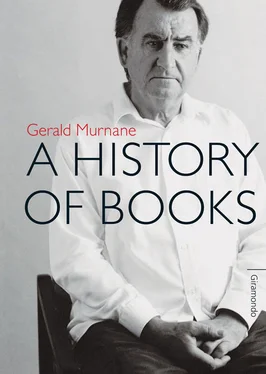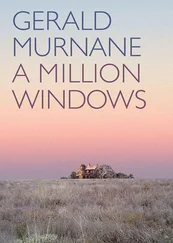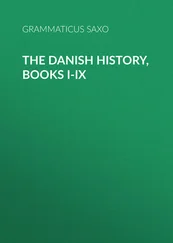I did not note as part of my final note, but I note here that I have never visited the Otway Ranges or wanted to visit them. I once wrote a passage of fiction the setting of which was a place in the Otway Ranges, but I have written many pieces of fiction the settings of which are places where I have never been.
After I had finished the notes mentioned above, I looked into the illustration of the persons who seemed to be waiting in a hall for the person who inspired them from time to time. I was looking for what I looked for whenever I looked into one or another photograph or reproduction of a photograph of persons who had been alive during the first twenty-five years of my own life and who might have lived during those twenty-five years in places such that I might have met up with one or another of the persons while I was living at one or another of the twenty-five and more addresses that I lived at during those twenty-five years and before I decided to live for the remainder of my life at the one address. I was looking for the face of a female person who might have met up with me, or might merely have come to my notice, and whose words or deeds, or whose face observed merely from a distance, might have inspired me to become one of the many persons I might have become and to live for the remainder of my life in one of the many places where I might have lived.
In the illustration that I looked at, the female faces seemed to be those of married women or very young children. (I took no interest in the faces of the two nuns in the front row.) I supposed that the early settlers at the settlement had been families with small children. And then I read the text of the feature article beside the illustration. I found the text sentimental and dishonest, but in order to explain this finding of mine I would have to report certain facts that are not part of this piece of fiction.
After I had done all the things so far reported I made notes for, and later wrote, the following pages, which themselves make up a complete piece of fiction within the whole of this piece of fiction.
I was eleven years of age when I first heard of the settlement that I shall call hereafter Outlands. The settlement was in neither the south-east nor the south-west of Victoria but in the far north-east of the state, and it had already been established for several years before I first heard of it.
When I first heard of Outlands, one month short of fifty years ago, I was already living at a place that had been until recently a sort of settlement founded and managed by a small group of Catholic laypersons who were, in their own way, inspired. This place, which I shall call hereafter the Farm, was in a northern suburb of Melbourne. From the front gate of the Farm I could see, only a short walking distance away, a tram terminus; and yet the suburbs of Melbourne reached in those days so little distance from the city that I could look out from the rear gate of the Farm across a paddock where a few dairy cows had been kept until recently. On either side of this gate were sheds where tools and cattle feed had been stored, and one shed that had been the dairy. Between the sheds and the house was a neglected orchard overgrown with long grass. Where the orchard adjoined the kitchen garden of the house was a small bluestone building that had been the chapel.
I was living at the Farm as a poor relation of the family whose home it then was. That family consisted of an elderly husband and wife, their only son, who was a widower in early middle age, and his only son, who was five years younger than myself. My own family — my parents and my sister — were scattered among relatives and friends because we had no house of our own. A few months before, my parents had had to sell the house they partly owned in a suburb not far from the Farm. They had needed the money to settle my father’s debts. He had incurred these debts as a part-time trainer of racehorses and as a punter. When my parents had put up the house for sale, they had believed they could move after the sale to a partly built house in an outer south-eastern suburb. Not all of my father’s racing friends were luckless gamblers. One friend was what was called in those days a speculative builder. He was going to let my family live in one of his partly built houses while my father tried to arrange a loan from a building society. But something had delayed this plan, and we found ourselves for the time being homeless. My mother and my sister went to stay with one of my mother’s sisters. My father boarded with friends of his. I went to the Farm.
I remember no feelings of misery or even discontent. The Farm was a haven of order and neatness after the latest of the many crises that my father’s gambling had caused. I was especially pleased not to have to attend school. I was tired of going to one after another school and being always someone newly arrived or soon to leave while everyone else seemed settled. I arrived at the Farm in the first week of November, and it was decided that I could do without school for the last months of the year. In the main room at the Farm was a tall cupboard full of books. I promised my father when he left me at the Farm that I would read every day, even though he seemed too concerned about his own problems to care how I might spend my time.
I was a relation of the people at the Farm because the widower’s dead wife had been one of my father’s sisters. I shall call the widower hereafter Nunkie. The name suits my memory of him as being always cheerful and helpful towards his nephew, myself. Nunkie might have been a scholar on the staff of a university if he had been born in a later decade, but he had been obliged during the Great Depression to train as a primary teacher for the Education Department of Victoria. He had met his future wife when he was teaching at the small school near the farm where my father and his sisters grew up. The school had a residence beside it for a married teacher, but Nunkie lived in the residence with his parents. Nunkie’s parents had come with their son to the far south-west of Victoria for the time being because the father could no longer get work as a musician in picture theatres after the silent films had been replaced by talkies, and because he had been a reckless gambler on racehorses for as long as he had lived in Melbourne. I shall call this man hereafter the Reformed Gambler, because his years away from Melbourne had apparently reformed him. I never saw him looking at a form guide or listening to a race broadcast while I was at the Farm, and every Saturday he went off to umpire one or another local cricket match.
Nunkie and his mother always seemed united against the Reformed Gambler. The son and the mother mostly ignored him, or, if he tried to break into one of their many long discussions, put him off with short answers.
Every evening the people at the Farm, together with their many visitors, recited the rosary and a portion of the divine office for the day. The Reformed Gambler was obliged to take part in these prayers, although I could see that they bored him. He was a gentle, likeable man whose religious observance consisted of Sunday mass and an occasional confession and communion. One evening, after twenty or thirty minutes of prayer during which the word ‘Israel’ had occurred a number of times ( Remember, O Israel…I have judged thee, O Israel… and the like), the Reformed Gambler looked in the direction of his wife and son and asked innocently who was this Israel, anyway: this chap who was always turning up in our prayers.
Much of what I know about the family at the Farm I learned at one or another later time from my father. According to him, the father at the Farm was the salt of the earth, the mother looked down her nose at the world, and the son meant well but had been turned by his mother into an old woman himself. On the evening when the Reformed Gambler had asked who Israel was, I actually saw his wife look down her nose. There is no better form of words to suggest the pose that she struck. Her son, Nunkie, tried to relieve the tension by saying, not directly to his father but into the air, that Israel was not a man but a people, and not even a people but a symbolic people…
Читать дальше












